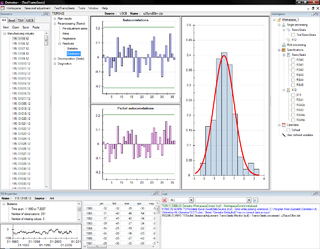
Interoperability is a characteristic of a product or system to work with other products or systems. While the term was initially defined for information technology or systems engineering services to allow for information exchange, a broader definition takes into account social, political, and organizational factors that impact system-to-system performance.

Open-source software (OSS) is computer software that is released under a license in which the copyright holder grants users the rights to use, study, change, and distribute the software and its source code to anyone and for any purpose. Open-source software may be developed in a collaborative, public manner. Open-source software is a prominent example of open collaboration, meaning any capable user is able to participate online in development, making the number of possible contributors indefinite. The ability to examine the code facilitates public trust in the software.
Free and Open source Software Developers' European Meeting (FOSDEM) is a non-commercial, volunteer-organized European event centered on free and open-source software development. It is aimed at developers and anyone interested in the free and open-source software movement. It aims to enable developers to meet and to promote the awareness and use of free and open-source software.

Free and open-source software (FOSS) is software available under a license that grants users the right to use, modify, and distribute the software – modified or not – to everyone free of charge. FOSS is an inclusive umbrella term encompassing free software and open-source software. The rights guaranteed by FOSS originate from the "Four Essential Freedoms" of The Free Software Definition and the criteria of The Open Source Definition. All FOSS must have publicly available source code, but not all source-available software is FOSS. FOSS is the opposite of proprietary software, which is licensed restrictively or has undisclosed source code.
The cancer Biomedical Informatics Grid (caBIG) was a US government program to develop an open-source, open access information network called caGrid for secure data exchange on cancer research. The initiative was developed by the National Cancer Institute and was maintained by the Center for Biomedical Informatics and Information Technology (CBIIT) and program managed by Booz Allen Hamilton. In 2011 a report on caBIG raised significant questions about effectiveness and oversight, and its budget and scope were significantly trimmed. In May 2012, the National Cancer Informatics Program (NCIP) was created as caBIG's successor program.

The European Union Public Licence (EUPL) is a free software licence that was written and approved by the European Commission. The licence is available in 23 official languages of the European Union. All linguistic versions have the same validity. Its latest version, EUPL v1.2, was published in May 2017. Revised documentation for v1.2 was issued in late‑2021.
In free and open-source software (FOSS) development communities, a forge is a web-based collaborative software platform for both developing and sharing computer applications.
The Semantic Interoperability Community Europe (SEMIC.EU) was an eGovernment service initiated by the European Commission and managed by the Interoperable Delivery of European eGovernment Services to public Administrations, Businesses and Citizens (IDABC) Unit. As one of the 'horizontal measures' of the IDABC, it was established as a permanent implementation of the principles stipulated in the 'European Interoperability Framework' (EIF). It offered a service for the exchange of semantic interoperability solutions, with a focus on demands of eGovernment in Europe. Through the establishment of a single sharing and collaboration point, the European Union wanted to resolve the problems of semantic interoperability amongst the EU member states. The main idea behind the service was to make visible specifications that already exist, so as to increase their reuse. In this way, governmental agencies and developers benefit as they do not reinvent the wheel, they reduce development costs, and increase the interoperability of their systems.
The open-source software movement is a social movement that supports the use of open-source licenses for some or all software, as part of the broader notion of open collaboration. The open-source movement was started to spread the concept/idea of open-source software.
All European countries show eGovernment initiatives, mainly related to the improvement of governance at the national level. Significant eGovernment activities also take place at the European Commission level as well. There is an extensive list of eGovernment Fact Sheets maintained by the European Commission.

JDemetra+ is a computer program for seasonal adjustments that was developed and published by Eurostat – European Commission. It supports TRAMO&SEATS and X-12-ARIMA methods of adjustment.
An open repository or open-access repository is a digital platform that holds research output and provides free, immediate and permanent access to research results for anyone to use, download and distribute. To facilitate open access such repositories must be interoperable according to the Open Archives Initiative Protocol for Metadata Harvesting (OAI-PMH). Search engines harvest the content of open access repositories, constructing a database of worldwide, free of charge available research. Data repositories are the cornerstone for FAIR data practices and are used expeditiously within the scientific community.

The Asset Description Metadata Schema (ADMS) is a common metadata vocabulary to describe standards, so-called interoperability assets, on the Web.
DuraSpace was a 501(c)(3) not-for-profit organization founded in 2009 with the merger of the Fedora Commons organization and the DSpace Foundation, two of the world's largest providers of open source digital repository software. In 2011, DuraSpace launched DuraCloud, an open source digital preservation software service. In July 2019, DuraSpace merged with Lyrasis, becoming a division of that organization.
The digital commons are a form of commons involving the distribution and communal ownership of informational resources and technology. Resources are typically designed to be used by the community by which they are created.

Joinup is a collaboration platform created by the European Commission. It is funded by the European Union via its Interoperability Solutions for Public Administrations Programme.
On April 21, 2021 data.europa.eu was launched as a single access point for open data published by EU Institutions, national portals of EU Member states and non-member states, as well as international organisations of predominantly European scope. The portal consolidates datasets previously available via the EU Open Data Portal and the European Data Portal into a single meta-catalogue. The European Data Portal, launched in its beta version on November 16, 2015, was an initiative of the European Commission, and part of the Digital Single Market.

Nextcloud is a suite of client-server software for creating and using file hosting services. Nextcloud provides functionality similar to Dropbox, Office 365, or Google Drive when used with integrated office suites Collabora Online or OnlyOffice. It can be hosted in the cloud or on-premises. It is scalable, from home office software based on the low cost Raspberry Pi, all the way through to full sized data centers that support millions of users. Translations in 60 languages exist for web interface and client applications.
The once-only principle is an e-government concept that aims to ensure that citizens, institutions, and companies only have to provide certain standard information to the authorities and administrations once. By incorporating data protection regulations and the explicit consent of the users, the public administration is allowed to re-use and exchange the data with each other. The once-only principle is part of the European Union's (EU) plans to further develop the Digital Single Market by reducing the administrative burden on citizens and businesses.
OpenUK is a UK-based not-for-profit company which supports open source collaboration and open technologies within the United Kingdom. Its primary stated focus is to develop and sustain UK leadership in "open technology", consisting of open-source software, open-source hardware and open data. Participants in OpenUK are organisational supporters as well as individual volunteers and committee members, which constitute a body of expertise. In 2020, OpenUK was identified as a key strategic player in UK open source within the European Commission Open Source Software Country Intelligence Report for the United Kingdom, alongside the British Computer Society. The Chief Executive Officer and Chief Policy Officer for OpenUK is Amanda Brock.







